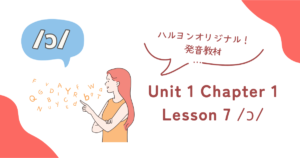
ハルヨンのレッスンで使用しているそーた式! まるでネイティブのような「英語の発音」が身につく魔法の法則40の小テストです。
CHAPTER1 発声編
P014 魔法の法則No.01 口はおおげさなくらいに開く
P015-track001
Hi, I am Tim
P016-track002
bag, tennis, desk
P017-track004
私はティムです。 ※英語の口の開きを取り入れた日本語の読み方で
P020 魔法の法則No.02 音をしっかり伸ーばーす
P022-track006
How are you? Are you OK?
P023-track007
This is wonderful. I love it!
P024-track008
I was working so hard.
P026 魔法の法則No.03 日本語を話す外国人になりきる
P027-track010
私はチキン南蛮が大好物なんです。
※英語らしい口の開きでの読み方で
P029 魔法の法則No.04 「お疲れボイス」でノドを開く
P030-track011
I am tired today, so I will go to bed now.
P031-track012
あああーーー、疲れたーーー、あああーー ※「お疲れボイス」を出してみよう!
P033 魔法の法則No.05 気分は「イケボ」で低い声を意識
P034-track013
次の例文を「ノド声」で読んでみましょう。
I like to study English and play tennis.
CHAPTER2 日本語のあいうえおを英語のアイウエオにする魔法
P040 魔法の法則No.06 母音を巧みにズラす
例文の練習は不要です。本文を2回通読ください。
Phonics Chant
発音学習をする前の準備として下記の動画を視聴し、「日本人がよく読むアルファベットの読み方」と「フォニックス」の違いを学んでください。
(小テスト) Chapter2 母音をズラすで登場する音 A, I, U, E, O を正しく発音できるように動画を視聴ください。
P048 魔法の法則No.07 ア(a)はアとエの間のエアにズラす
P049-track018
1 bag, 2 happy, 3 sad, 4 rabbit, 5 catch,
6 can, 7 at, 8 passion, 9 after, 10 about
P053-track019
英語らしい読み方で
hat, have
P056-track020
Sam became happy after his cat came back home.
(VOA) Hot to Pronounce ae, A Relaxed Sound
The cat in the hat.
relaxed and flat
Your lips are relaxed, your tongue is flat.
カタカナ英語を卒業しよう シュワ(schwa ə)
レッスン -2:06
/ə/ 暗くて弱い音
0:54-
about, family, support, student, history
カタカナ英語にしないためには
1. アクセントがどこにあるかを確認する。 ※とにかくアクセントが大事
2. アクセントのないところは弱い音
2:07-
前置詞(to, for, of, at, as) 強調しないとき
Two tickets to Paris, please. ※/tə/
Four tickets for Mary Poppins, please. ※/fə(r)/
カタカナ英語にならないように強調するところは強調して、あとはサクッとschwa
3:57- 例文 リンキングは黄色
- Can I borrow your pencil?
- It’s probably going to(gonna) snow again.
- We had to wait half an hour for the bus.
P059 魔法の法則No.08 イ(i)はエにズラす
P060-track021
this, sit, milk, family, kiss, imagination, happiness, guitar, English.
P062-track022
- bid, bed
- big, beg
- bill, bell
- fill, fell
- pit, pet
- till, tell
P064-track023
- She hit the ball.
- He will play tennis.
- This episode is interesting.
- I decided to go.
- My sister gives her cat some milk every morning.
- My situation is different from his situation
P065 魔法の法則No.09 ウ/ウー(u)はイウにズラす
P066-track024
put, push, cook, cute, music, computer, you, to, do
P070-track025
It took time to choose a good cap.
補足 two
two レッスン 0:39-1:30
P072 魔法の法則No.10 エ(e)は「お疲れボイス」でエにズラす
P073-track026
egg, bed, pen, get, tell, when, said, friend, many, any
P075-track027
I say “I like eggs and pens” to my friend every day.
P076 魔法の法則No.11 オー(o)はオーウ、オ(o)はアに「お疲れボイス」でズラす
P077-track028
so, no, oh, hope, open, go, snow, nose, over, low
P078-track029
not, hot, computer, song, top, shot, of, on
P080-track030
- low, law
- hole, hall
- so, saw
関連Youtube動画
リンク先記事の「関連Youtube動画」の箇所に追加の発音教材と小テストが有ります。
- walk work
- all
- law raw low

P081 魔法の法則No.12 O(ア)とU(ア)は「お疲れボイス」でアのまま
P082-track031
- My mom loves nuts.
- I cut up a pumpkin.
P083-track032
- staff stuff
- match much
- app up
- fan fun
- Sam some
Chapter1, 2の補足
英語の音節
0:05 – 3:12
1音節で発音してください。
- cat, stretch
- go, have, like, think
- bought, thought, found
(参考動画)
0:24 –
英単語のストレス
レッスン 0:07 – 2:38
baNAna
caREER, CARRier
2:50 – 4:54
ORange
I’d like some orange juice.
DAMage
My luggage has been damaged.
hoTEL
Can you take us to Aiueo hotel?
INternet
Can I use the internet in my room?
MANager
I want to speak to your manager.
内容語と機能語
内容語は名詞・動詞・形容詞・副詞に代表されるような実質的な意味をもつ語のこと。
機能語は接続詞・冠詞・助動詞・前置詞・代名詞、be動詞など主に文法機能を担う語のこと。
レッスン 0:34-3:00
We’re inviting passengers with small children.
3:25-
- It’s snowing a lot outside today.
- Do you have any plans for Christmas?
- We’ll probably just stay at home and relax.
- Did you know that every single snowflake is different?
- When you go outside, wear your jacket to keep yourself warm /wˈɔɚm/.
Be動詞は短く発音しよう
レッスン 0:24 – 2:50
I think you’re lying.
No, I’m not!
Yes, you are (lying)!
I’m, you’re, he’s, she’s, we’re, they’re
3:03-5:18
I’m sorry I’m late!
Tell me when you’re done.
She’s not happy about it.
We’re in big trouble.
【意味】困ったことになったぞ、大変なことになった.
What’s up, guys? How’re you doing?
【意味】「What’s up?」は、「やぁ」「こんにちは」「最近どう?」「元気?」「やあ、どうしてる?」「どうだい?」「最近調子どう?」などという意味
When’s your birthday?
What’s the best time to call you?
Function words
※レッスン 2:18-5:19 機能語の発音実例
Function Words 機能語: Unstressed in sentences
- Articles 冠詞: a, an, the
- Conjunctions 接続詞: and, but, so, if
- Prepositions 前置詞: on, off, under
- Pronouns 代名詞: I, you, him, her
- Helping Verbs 助動詞: am, be, do, can
2:18- to ⇒ tuh /tə/
- I want to go.
- The concert is tonight
- Let’s meet up tomorrow
2:45- for ⇒ fer /fɚ/
- I’d like a table for two.
- What should we eat for dinner?
3:07- your / you’re ⇒ yer /jɚ/
- Is this your car?
- You’re doing great! Keep it up!
3:27- you ⇒ yuh /jə/
- What are you doing?
- You need to do this today.
3:47- can ⇒ kn /kn/
- I can meet you at five.
- How can this be?
4:07- and ⇒ an/æn/ or n /n/
- Peanut butter and jelly.
- She and I are friends.
4:28- at/æt/ ⇒ uht /ət/
- Meet at nine.
- Let’s sit at the table.
4:46-
he, him, her, his はhの発音が省略される。themはthの発音が省略される
he ⇒ ee /i/
- What did he want?
her ⇒ er /ɚ/
- Give her this for me.
him ⇒ im /əm/
- She likes him!
Chapter3 アルファベット編 ネイティブっぽさをグンとUPさせる魔法
P088 魔法の法則No.13 3種類のT① – Tの後ろに母音が来たらTはラ行に変身させる
P089-track033
This computer is better, but I think it’s too big.
P090-track034
I wrote a letter but it is too long, so I will write it again.
母音+T+母音→D
レッスン 1:48-4:20, waterの発音 母音に囲まれたtはdと発音する。
2:37-
water /waa·tr/, computer, refrigerator,
waiter, alligator, see you later, letter, better
3:26- 例文で練習
- Would you like some water?
- Excuse me, could I have some more water please?
- Could I get you anything to drink? Maybe some water, or a soda?
- Do you prefer tap, or sparkling water?
レッスン 0:28-2:25 イギリス英語とアメリカ英語で比較
ラ行(r)とダ行(d)の中間、アメリカ英語(関西弁)・イギリス英語(東京弁)
- water, daughter, heater
- city, forty, party, ability.
2:24- 英単語で練習
- pretty butter, letter, better.
- native, meeting, beautiful, hospital.
3:16- 文章で練習
- Kyoto is a pretty city.
- I’m writing a letter on my computer.
- Can I have a bottle of water, please?
- I’m getting better at swimming.
Party
P094 魔法の法則No.14 3種類のT② – Tの後ろに母音がないときはサッと消す
P095-track035
That computer is what my mom bought last Sunday.
P098-track036
I cut the little apples and tomatoes and put them on the beautiful plate.
P096 単語の中ほどにある「t+子音」も同じ
absolutely, definitely ※telyのeが発音されていない。
Tの省略
0:39-2:21 解説
3パータンに省略
1. 息をはかないT
2. ちっちゃい「っ」のT ※喉の奥で息を止める。声門閉鎖音 glottal stop
3. 完全に消えるt
- COSTCO /ˈkɔstko/
- Credit card
2:31-
- I must go.
- Let’s take a shortcut!
- Get ready! Get set! Go!
- Let’s do it now!
- He is quite popular at school. */kwάɪt(米国英語)/
- What is your favorite book? * /féɪv(ə)rət(米国英語)/
- There’s not much difference.
- It’s a perfect day for a picnic.
- What did you do last week?
4:38- 単語の末尾のtも発音しない
- I walk to school.
- I walked to school. */wɔːkt(米国英語)/
- iced tea */aɪst(米国英語)/
- mashed potatoes */mæʃt(米国英語)/ すり潰した
- baked potatoes */bekt/ 焼いた
魔法の法則No.14 補足 – Stop T, アクセントのある音-T-schwa-N
P096 absolutely, definitelyの追加説明
しゃっくりt、声門閉鎖音のT(glottal T, stop T) – アクセントのある音-T-schwa-N
レッスン 1:28-4:38, 5:19 – 6:12 ※重要であるため長め
0:47- mountain, kitten, button, certain
1:28- しゃっくりt、声門閉鎖音のT(glottal T, stop T): tの音の代わりに、喉の奥で一瞬息の流れを止める、しゃっくりd
- but *tがはっきり聞こえない
- eat
- get
- button *bunッn
- eaten *eaッn
- gotten *goッn
(5:19 – 6:12)音節の語尾のTの後にNがあると音声変化する。tとnの間の母音をなくして、すぐにnの音に移る
- mountain *mounッn
- certain *cerッn,
- certainly *cerッnly
- Britain *Briッn
- Manhattan *Manhaッn
- written *wriッn
(6:13-)しゃっくりd
- sudden *suドゥn
- suddenly *suドゥnly
important – アクセントのある音-T-schwa-N
レッスン 1:57-3:19 (しゃっくりt)
- 0:42- Mの音 ンム
- 1:01- Rの音 Rの3ステップ
- (1:57-) t ant の音声変化、しゃっくりT、stop T → tの次の母音aを発音しない ※アクセントのある音-T-schwa-Nの場合、schwaは発音しない。
- 語尾のTを発音しないことも
- 音節の数 im-por-tant ⇔ 日本語はイン・ポー・タン・トの4音節
アクセントのある音-T-schwa-N
レッスン 0:17-3:11
- mountain/mάʊntən/
- curtain/kˈɚːtən/
- sentence/sénṭəns/
- cotton/kάtən/
/tən/を含む英単語: fountain, kitten, button, written, Clinton, Manhattan
『フラップT』はアメリカ英語にのみおこる、Tの特殊な発音です。
1:22- curtainの補足
フラップ (flap)とは「(~に当たって)パタパタと動く・動かす」「(~を平いしなやかなもので)叩く」という意味
→『フラップT』はまさしく舌先で上あごを「軽くはじく」ことによって出る音。
例) water/wˈɔːṭɚ/, better/béṭɚ/, party/pάɚṭi/
フラップT は” t が前後を母音に挟まれて”、かつ”t を含む音節にアクセントが置かれていない”場合に起こる。
P099 魔法の法則No.15 3種類のT③ – Nの後ろのTはナ行に変身させる
P100-track037
I had an interview at a famous international company last week.
P102-track038
I went to the center sit on the chair and I’ve been there twice now.
nt + a, i, u, e, o, y →tの脱落
(レッスン)冒頭-1:13まで ※米国・英国英語の違い、Identify、(レッスン)4:44-5:36 Why drop the T.
1:22- Identify /ɑɪdénṭəfὰɪ(米国英語), aɪˈdentʌˌfaɪ(英国英語)/
identification /ɑɪdènṭəfɪkéɪʃən, aɪdentʌfʌˈkeɪʃʌn(英国英語)/
2:06- twenty /twénṭi(米国英語), ˈtwɛn.ti(英国英語)/
2:51- Wanted, want another (one another お互いに )
4:00- want a /ˈwɑnt ə/, want to /ˈwɑnt tə/
- I want a Coke.
- I want to leave now.
5:47- Counter, /kάʊnṭɚ(米国英語), kάʊntə(英国英語)/
- Count on (意味)~頼りにする /kάʊnt an/
- Counted: Counted twenty
- Counting: I’m counting on you, I’m counting on that.
6:49- Disappointed, Disappointing
8:05- EXCEPTION: Syllable break within a word ※例外 音節の切れ目が1単語の中にある場合。これらはtの音をそのままにする。
Into, Entry, Antique.
(補足)nt + a, i, u, e, o + y →tの脱落: 以下の例文は余裕の有る人のみ取り組み下さい。
8:46- Pointed, Pointing
- I pointed out that we don’t need that.
- Is he pointing at me?
9:12- Printer, Printing, Printed
- I need a new printer.
- I’m printing it out after work.
- I printed it already.
9:22-
- I’m going to paint it pink.
- What a beautiful painting!
- We’re having our house painted when we’re on vacation.
9:39-
- I rented a car for vacation.
- Do they own their home? No, they’re renting.
9:47- “Inter” Words
- Internet: The internet is down.
- International: She’s studying international affairs.
- interview: I have a job interview next week.
10:01-
- The accounting office is closed.
- Everything’s accounted for.
P103 魔法の法則No.16 単語末のTDGはよく消えると心得る
P104-track039
Nate likes singing that song but it’s sad that he can’t sing very well.
P106-track040
I’m watching movies and my mom is cooking breakfast now.
P107 魔法の法則No.17 Nの後にはヌを入れて、Mはンㇺで読む
P108-track041
My son looks like my mom.
P109-track042 nの後にはヌ
again, learn, man, on, station, ten, alone, bone, line, one
P110-track043
I go to the station to meet my friends on Sunday.
P110-track044
Tom came to talk to my mom.
P111-track045 mはンㇺを意識して
him, swim, team, item, aim, time, name, come, some, home.
P112 魔法の法則No.18 ing形の音は全てエンヌで読む
P113-track046
- I’m doing my homework.
- I’m eating bananas.
- I’m asking about it.
P115-track047
talking, walking, singing, shining
Nの発音(Nで音がおわる時) thin と thing の発音 ~ingはイングじゃない!?
P117 魔法の法則No.19 単語末の「ション」は「シェン」にズラす
P118-track048
- I am on vacation.
- I have a question.
- This is my decision.
P119-track049
- situation
- action
- position
- solution
- location
P120-track050
(ション⇒シェン)conversation, education, information, passion
(チョン⇒チェン)question, exhaustion, suggestion
(ジョン⇒ジェン)conclusion, decision, illusion, vision, version
English Pronunciation Lesson / -TION suffix (接尾辞)
0:26-2:22 レッスン
-tion: This part of the word is a suffix(接尾辞), a common ending in an English word. Words that end like this in English are almost always a noun. And the pronunciation of this syllable is always unstressed, which means it’s really quick.
-tion is pronounced “shun” ʃ(ə)n
4:25-
The syllable before -tion is the stressed syllable.
⇒ -tional, -tionally も同様のルールが適用される。
(小テスト) information *shunの発音で
2:45- Practice *shunの発音で
caution, tradition, frustration, conversation
3:15- stion *thunの発音で
question, exhaustion, digestion
4:25- stress *tionの前を強調して、shunの発音で
action, caution, tradition, frustration
connection, donation, repetition, inspiration ※数が多かったので最初の8単語のみ
P121 魔法の法則No.20 アウの音は全てエアーウにズラす
P122-track051
How/hάʊ/ can you do that?
Get out now/nάʊ/!
P123-track052
- cow/kάʊ/
- town/tάʊn/
- down/dάʊn/
- loud/lάʊd/
- cloud/klάʊd/
Phonics Chant | ou, ow
レッスンでは動画全部
- house /hάʊs/
- mouse/mάʊs/
- pouch /pάʊtʃ/ ポーチ (革製の)小袋
- shout /ʃάʊt/
- cow/kάʊ/
- town/tάʊn/
- brown/brάʊn/
- owl/άʊl/
The Sound of Ou/Ow – Phonics song
loud, house, mouse, out, town, down, owl, cow
Chapter4 法則21以降





